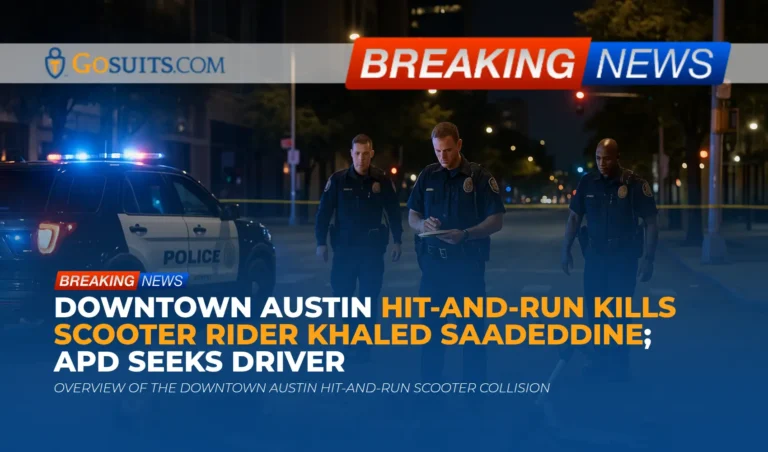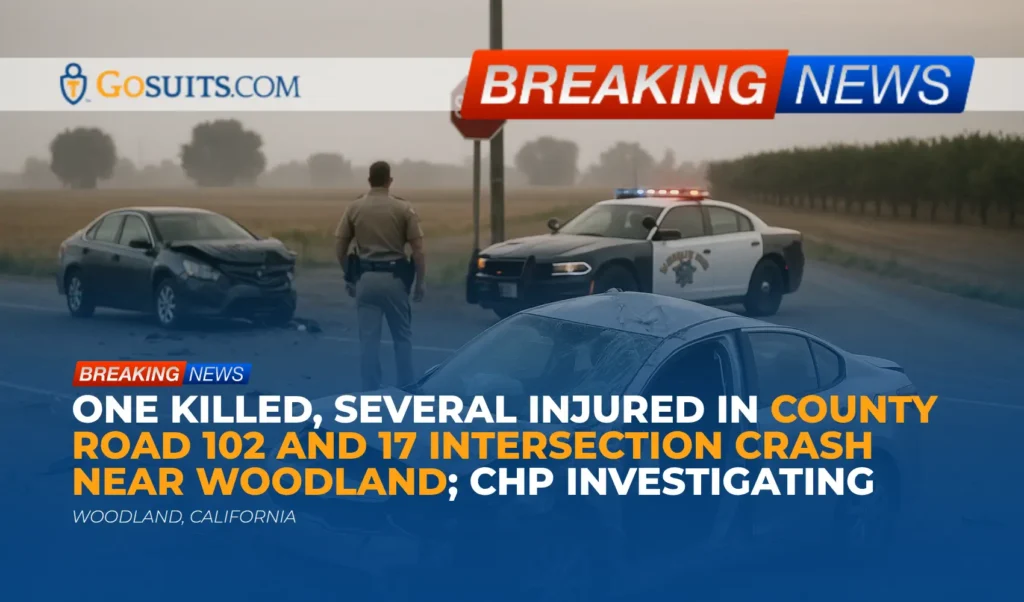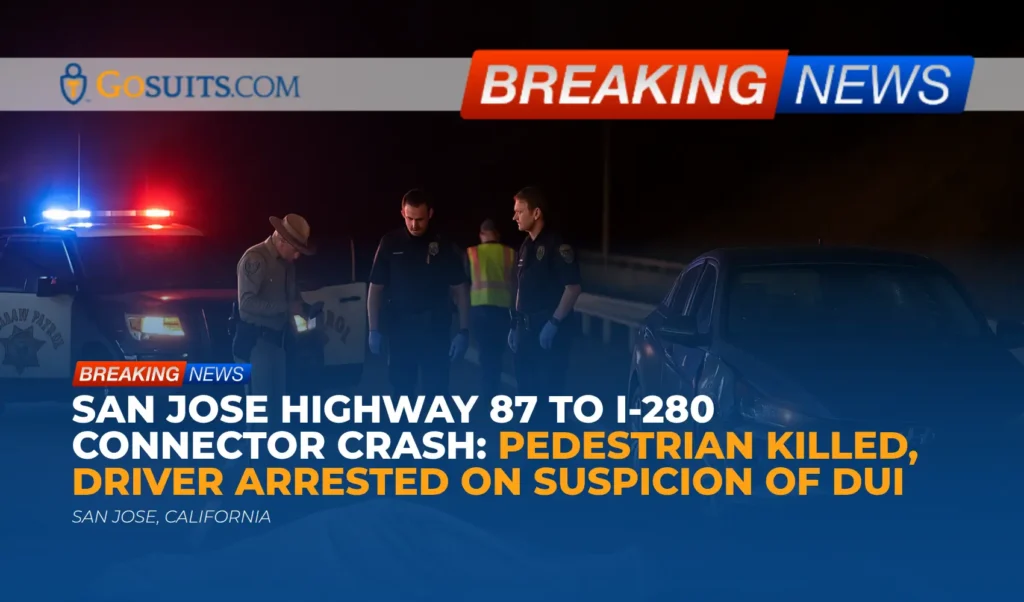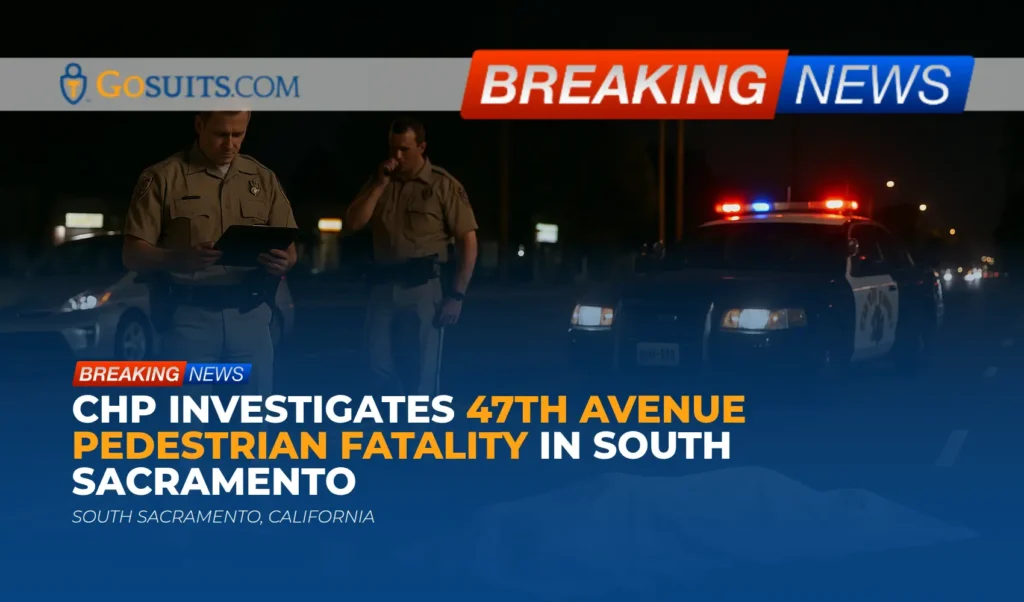- Overview of the Downtown Austin Hit-and-Run Scooter Collision
- What Is Known So Far: Timeline, Location, and Agency Statements
- How Hit-and-Run Fatality Investigations Typically Proceed in Austin
- Where Families Can Obtain Official Records and Updates
- Safety and Micromobility Context in Austin
- Civil Liability Considerations in a Texas Scooter Hit-and-Run
- Insurance Coverages That May Apply After a Scooter Collision
- Preserving Evidence and Protecting Your Rights
- Time Limits in Texas and Who May Bring Claims
- Community Impact and Prevention Measures
- How to Share Information With Investigators
- Action Steps To Consider Now
- Commentary from Gosuits Austin, Texas Personal Injury Attorney
Overview of the Downtown Austin Hit-and-Run Scooter Collision
Late Saturday night, just before midnight, a serious crash occurred near the intersection of East 11th Street and San Jacinto Boulevard in downtown Austin. Police responded to reports of a collision involving a vehicle and a person riding a scooter. Officers found the scooter rider, identified by authorities as 33-year-old Khaled Saadeddine, with life-threatening injuries. He was transported to a local hospital and died the following day.
According to officials, the vehicle involved left the scene, and the driver has not been identified. Austin police have asked for the public’s help to locate the individual responsible. The department noted this fatality is among a high number of deadly traffic incidents this year. While scooter-related fatalities are less common than other types of traffic deaths, any loss is deeply felt by loved ones and the wider community.
This article explains what is publicly known, outlines how investigations like this typically proceed in Austin, and provides practical guidance on where to obtain official records. It also discusses potential civil liability issues, insurance pathways that may help with costs, and steps that can help preserve important evidence. The intention is to offer compassionate, clear information for community members seeking to understand next steps.
What Is Known So Far: Timeline, Location, and Agency Statements
Based on publicly released information:
- Time and place: The collision was reported around 11:34 p.m. near East 11th Street and San Jacinto Boulevard in downtown Austin.
- Nature of crash: A vehicle and a scooter were involved. The driver of the vehicle reportedly fled the scene.
- Victim: The scooter rider has been publicly identified by police as 33-year-old Khaled Saadeddine.
- Outcome: He was transported to a local hospital and died on Sunday.
- Investigation: As of the latest public statements referenced in local reporting, Austin police had not made an arrest and had not identified the vehicle involved. A reward for tips was offered.
In Austin, fatal crashes are tracked as part of the city’s Vision Zero effort to end traffic deaths and serious injuries. For context on citywide traffic trends and safety initiatives, see the City of Austin’s Vision Zero resources and dashboard at austintexas.gov/visionzero.
How Hit-and-Run Fatality Investigations Typically Proceed in Austin
When a fatal collision occurs in Austin, several units and agencies may be involved:
- Austin Police Department response: Officers secure the scene, provide aid, collect initial evidence, and may request specialized units to document the crash.
- Crash reconstruction: Investigators commonly document roadway evidence such as debris fields, skid or yaw marks, roadway geometry, lighting conditions, and potential sightlines. They may review nearby security cameras or traffic cameras where recordings exist.
- Witness identification: Officers gather contact information for witnesses and canvass nearby businesses or residences for video footage.
- Medical examiner coordination: In fatal cases, the Travis County Medical Examiner’s Office becomes involved to determine the cause and manner of death and to complete official records.
- Public assistance: When a driver flees, police often appeal for tips and may offer rewards to encourage information that can help identify the driver and vehicle.
While specific investigative steps can vary, these processes aim to piece together what happened and who may be responsible. Families can request certain records as they become available, outlined below.
Where Families Can Obtain Official Records and Updates
In the aftermath of a fatal crash, multiple official documents may be created. Knowing where to request them can reduce stress during a difficult time.
Police Crash Report and Related Records
In Texas, crash reports for reportable collisions are maintained by the Texas Department of Transportation. Certified copies can be purchased through the Crash Records Information System. Requestors typically need the name of a person involved, the date of the crash, and the crash location.
- TxDOT Crash Report purchase: cris.dot.state.tx.us/public/Purchase
- TxDOT overview of crash reports: txdot.gov/safety/traffic-crash-reports.html
For broader incident materials such as 911 audio, dispatch logs, incident reports, CAD sheets, or body-worn camera footage where releasable, public information requests can be submitted to the City of Austin.
- Austin Police Department records and public information requests: austintexas.gov/department/public-information-requests
- APD main page for unit contacts and information: austintexas.gov/department/police
Autopsy, Medical Examiner Records, and Death Certificates
The Travis County Medical Examiner’s Office handles medicolegal death investigations in this area. Depending on the case and Texas law, certain records may be available to next of kin upon request.
- Travis County Medical Examiner’s Office: traviscountytx.gov/medical-examiner
For official death certificates, Texas Vital Statistics provides certified copies. Requestors can apply online, by mail, or in person, following identity and eligibility requirements.
- Texas DSHS Vital Statistics, Death Records: dshs.texas.gov/vital-statistics/death-records
Victim Services and Support
The Austin Police Department’s Victim Services Division can assist with crisis intervention, guidance on resources, and navigating next steps. They also help explain the process for obtaining information and available support programs.
- APD Victim Services: austintexas.gov/department/victim-services
Texas also provides a Crime Victims’ Compensation Program that may help eligible victims or their families with certain financial burdens related to violent crimes. Eligibility and benefits are defined by state law.
- Texas Crime Victims’ Compensation (Office of the Attorney General): texasattorneygeneral.gov/crime-victims/crime-victims-compensation-program
Safety and Micromobility Context in Austin
The City of Austin permits shared micromobility devices such as e-scooters and outlines rules and safety guidance for riders and drivers. The city’s program is designed to help people move around urban areas, especially at night and on weekends, when many people use scooters for short trips.
- City of Austin Shared Micromobility: austintexas.gov/department/shared-micromobility
Nationally, injuries related to micromobility devices have risen in recent years as adoption has grown. A report from the U.S. Consumer Product Safety Commission noted increases in injuries involving e-bikes and e-scooters, underscoring the need for safe riding behaviors and driver awareness in shared spaces.
- CPSC Micromobility Report: cpsc.gov/Newsroom/News-Releases/2023/…
In Austin, Vision Zero data and safety strategies aim to reduce serious crashes for all road users. The city tracks crash trends and implements engineering, enforcement, and education initiatives to improve safety for people walking, biking, scooting, and driving.
- City of Austin Vision Zero: austintexas.gov/visionzero

Civil Liability Considerations in a Texas Scooter Hit-and-Run
When a driver leaves the scene of a crash, it raises serious safety and legal concerns. Under Texas law, drivers have duties after a collision that causes injury or death. While criminal enforcement is separate from civil claims, a failure to stop and render aid can inform civil liability assessments. Texas Transportation Code section 550.021 addresses a driver’s obligations after collisions involving injury or death.
- Texas Transportation Code 550.021 (duties after an accident involving death or personal injury): statutes.capitol.texas.gov/Docs/TN/htm/TN.550.htm#550.021
From a civil perspective, key questions include:
- Negligence: Did the driver fail to use ordinary care, such as by speeding, failing to yield, inattention, or other unsafe operation around a vulnerable road user on a scooter.
- Negligence per se: If a driver violated a safety statute intended to protect road users and that violation caused harm, that can be relevant to civil liability.
- Comparative responsibility: Texas law apportions responsibility among parties. Even if there are allegations of shared fault, families can still seek accountability where supported by evidence.
- Third-party liability: In some cases, commercial drivers, employers, vehicle owners, or entities responsible for vehicle maintenance might be implicated, depending on facts. Each case requires careful evaluation of the evidence.
Evidence often includes scene measurements, vehicle damage patterns, onboard vehicle data where available, surveillance videos, and medical and autopsy findings that can help clarify mechanism of injury and impact dynamics.
Insurance Coverages That May Apply After a Scooter Collision
Insurance can play a critical role following a hit-and-run. Available coverages may come from multiple sources.
- Uninsured or Underinsured Motorist (UM/UIM): In Texas, UM/UIM may cover injuries if the at-fault driver is uninsured, underinsured, or unidentified, including situations where someone is struck as a pedestrian. The Texas Department of Insurance notes that UM/UIM can protect you when you are in your own car, someone else’s car, or even on foot. See the Texas auto insurance consumer guide for more details.
- Personal Injury Protection (PIP): PIP can cover medical expenses and a portion of lost income regardless of fault. In Texas, PIP is included in auto policies unless rejected in writing. PIP may cover you if you are injured as a pedestrian in a vehicle-related crash.
- Medical Payments (MedPay): Similar to PIP but with important differences, MedPay can help with medical costs up to the purchased limit.
- Health Insurance: Health plans can help with treatment costs, subject to deductibles and copays. Plans may seek reimbursement if there is a third-party recovery, depending on plan terms and Texas law.
- Crime Victims’ Compensation: For eligible victims of violent crimes, Texas’s program may offer assistance for certain expenses.
Authoritative resources:
- Texas Department of Insurance, Auto Insurance Guide: tdi.texas.gov/pubs/consumer/cb020.html
- Texas Department of Insurance, Auto Insurance Tips: tdi.texas.gov/tips/auto-insurance.html
- Texas Crime Victims’ Compensation: texasattorneygeneral.gov/crime-victims/crime-victims-compensation-program
Important consideration: giving a recorded statement to an adverse insurer can affect future claims. It is prudent to speak with a qualified attorney first. What is shared with insurance adjusters may be used to minimize claims later.
Preserving Evidence and Protecting Your Rights
Evidence can disappear quickly after a crash, especially in a busy downtown area. To help protect your rights and keep options open:
- Preserve physical items: Keep the scooter and any parts, clothing, helmet, and accessories in a secure location.
- Document the scene: Save photos or videos from the night of the crash if available. Note weather conditions, lighting, roadway surface, and any obstructions.
- Secure witness information: If anyone reached out with what they saw, document names, phone numbers, and a brief summary of their observations.
- Save digital data: Back up location history, rideshare or scooter app trip data, and health tracker data that may show timing and movement.
- Request nearby video promptly: Many businesses overwrite footage in days. A timely public information request or direct outreach can make a difference. The City of Austin’s public information request portal is at austintexas.gov/department/public-information-requests.
- Avoid social media commentary: Public posts can be taken out of context and used by insurers to dispute claims.
- Consult an attorney before contacting insurers: Statements to any insurer, including your own, may affect coverage, fault assessments, and settlement discussions.
Time Limits in Texas and Who May Bring Claims
Texas law sets deadlines for bringing civil claims. Missing a deadline can result in losing the ability to pursue a claim, even when liability is clear.
- General limitations period: In Texas, the limitations period for personal injury and wrongful death civil actions is typically two years from the date of the injury or death. See Texas Civil Practice and Remedies Code section 16.003.
- Wrongful death claims: Texas Civil Practice and Remedies Code Chapter 71 allows certain surviving family members to bring a wrongful death action. Those with standing typically include the deceased person’s spouse, children, and parents.
- Survival claims: A survival action, under section 71.021, allows the decedent’s estate to pursue claims the decedent could have brought had they survived, such as for conscious pain and mental anguish before death and other damages supported by the evidence.
Authoritative statutory links:
- Texas Civil Practice and Remedies Code, section 16.003 (limitations): statutes.capitol.texas.gov/Docs/CP/htm/CP.16.htm#16.003
- Texas Civil Practice and Remedies Code, Chapter 71 (Wrongful Death): statutes.capitol.texas.gov/Docs/CP/htm/CP.71.htm
- Texas Civil Practice and Remedies Code, section 71.021 (Survival): statutes.capitol.texas.gov/Docs/CP/htm/CP.71.htm#71.021
There can be exceptions and nuances to these timelines. Prompt action helps ensure that evidence is preserved and that all deadlines are carefully tracked.
Community Impact and Prevention Measures
Downtown corridors like East 11th Street and San Jacinto Boulevard are heavily used by drivers, pedestrians, and micromobility riders. Preventing severe crashes in these shared spaces depends on a mix of street design, lighting, speed management, and public education.
- Infrastructure and speed: Well-designed intersections, appropriate speed limits, and visibility improvements can reduce conflict points and create safer crossing opportunities.
- Driver awareness: Drivers are urged to look carefully for scooters and bicycles, particularly at night and near entertainment districts and hotel corridors where riders are common.
- Rider practices: Riders benefit from following traffic rules, using lights at night, and riding predictably. City guidance for micromobility safety is available at austintexas.gov/department/shared-micromobility.
- Data-driven strategies: Vision Zero programs use crash data to identify and fix high-injury network locations. See austintexas.gov/visionzero.
The goal is a city where everyone can travel safely, regardless of how they get around.
How to Share Information With Investigators
Austin police have asked for the public’s help to identify the driver and vehicle involved in this hit-and-run. People with information that could assist the investigation can contact:
- Austin Police Department Vehicular Homicide Unit: 512-974-8111
- Capital Area Crime Stoppers for anonymous tips: 512-472-8477
When calling, details such as vehicle make, model, color, damage location, partial plate, time and direction of travel, and any distinguishing features are especially helpful. If you have video, preserve the original file and note time stamps.

Action Steps To Consider Now
The window to protect rights and preserve evidence can be brief. The following steps can help keep options open and reduce the chance of lost information.
- Collect and safeguard records: Gather medical bills, hospital records, and any communications from law enforcement and emergency responders. Maintain a single, organized file.
- Request official documents early: Obtain the TxDOT crash report when it becomes available and consider requesting incident materials from the City of Austin through a public information request.
- Preserve video: Ask nearby businesses or property managers to retain footage from the time of the collision. Many systems overwrite within days.
- Document losses: Keep a ledger of expenses, travel to medical appointments, and time away from work. Save receipts for out-of-pocket costs.
- Consult a qualified attorney first: Before contacting any insurance company, speak with an attorney for a free consultation. Statements to insurers may be recorded and could be used to challenge or limit a claim later.
- Review insurance policies: Locate any applicable auto, UM/UIM, PIP, MedPay, and health policies. Note policy numbers and claim deadlines.
- Explore state assistance: Evaluate eligibility for Texas Crime Victims’ Compensation and follow application steps if appropriate.
- Be mindful of deadlines: Texas limitations periods are strict. Acting sooner helps ensure that legal time limits are met and that evidence remains accessible.
The benefit of acting now is clarity and control. Early steps help define the factual record, secure financial pathways for necessary care and arrangements, and prevent avoidable delays later in the process.
Commentary from Gosuits Austin, Texas Personal Injury Attorney
We extend our heartfelt condolences to the family and friends of Mr. Saadeddine. Losing a loved one in a sudden crash is devastating. The information above is provided for educational purposes and general guidance to help the community understand the processes that follow a fatal collision and the options that may exist.
In our view, the circumstances described raise serious concerns about driver responsibility and community safety in a busy downtown setting where scooters, pedestrians, and vehicles share the road. When a driver leaves the scene, families are left without answers at the very moment they need them most. Thorough investigation, careful evidence preservation, and timely access to official records are critical to understanding exactly what happened and why.
In the aftermath of a collision, insurance companies and corporate stakeholders often move quickly. Adjusters may contact families seeking statements before the full facts are known. These conversations can feel routine, but they are not neutral. Insurers frequently use statements and early documentation to minimize fault or reduce payments, particularly when liability is contested or the at-fault driver is unidentified. The language used in claim forms and recorded calls can have long-term consequences, including on UM/UIM and PIP benefits or on future negotiations with any at-fault parties that may be identified.
This is why obtaining a free consultation with a seasoned personal injury attorney can be so important. A consultation helps families understand available insurance coverages, the types of damages that may be recoverable under Texas wrongful death and survival laws, and the steps needed to protect evidence and meet deadlines. It also provides a buffer before communicating with insurers, ensuring that information is complete and accurate and that rights are preserved while the investigation unfolds.
As Austin continues to grow, we are committed to a safer city where people can move with confidence, whether driving, walking, or riding a scooter. Clear, reliable information and respectful support for affected families are essential parts of that effort.






